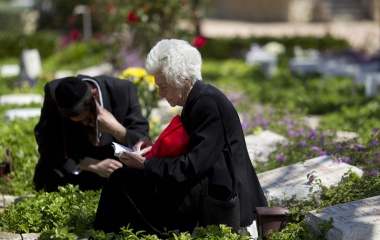
If we couple memory loss even at the best of times, with the fact that there is no statute of limitations[2] in Jewish law how can one ensure that testimony on events of long ago reflect what actually happened?
“Our Rabbis taught: one may write testimony on a document and he may testify from it even after many years” (Ketubot 20a). There is no better way to remember something than to put it in writing[3]. Knowing one may have to testify in the future and eager to ensure one’s testimony be as accurate as possible one records the events soon after they occur.
Yet to what extent these notes can be relied upon is a Talmudic dispute. Rav Huna is of the view that these notes are admissible in court only if they serve to corroborate the storyline which is recalled without need for notes. They may amplify a detail or two but they are only there to back up one's memory. Rav Yochanan adopts a more accepting view allowing these notes to be used even if one’s memory is most sketchy and only through the reading of the notes are events of the past recalled. However all agree that if one has forgotten the bulk of the story and uses the notes themselves not to jog one’s memory but as the source of his testimony such would be invalid. Jewish law requires that testimony be based on “their mouth - not from their writings” (Yevamot 31b).
We are accustomed to value the written word over the oral. Get it in writing is a basic mantra of modern business practice. It is easy to deny what one said (at least it was before smartphone cameras) yet one cannot so easily dismiss the written word. And it is for this reason that one who lends money without having witnesses sign a loan document violates the prohibition of “placing a stumbling block before the blind” (Bava Metziah 75b). With no evidence to prove the loan ever took place one may be tempted to deny such. And while I may never do so I must not tempt others.
Yet despite the evidence the written word provides, the oral word can be so much more powerful, something great orators - both for good and evil - have long known. While a book can inspire, a powerful preacher can motivate in a way that no book can. And while the written word is abstract the oral word is a manifestation of the speaker before us. It is relatively easy to fabricate events in print but to look someone in the eye and speak mistruths takes a level of chutzpah that most do not have. Such Talmudic notions that “one would not brazenly lie to the face of his creditor” (Ketubot 18a) is based on the power of the oral word. And this is why many who are forced to apologize do so in writing- facing the individual is too difficult for many. But it is an oral confession which Judaism requires in order for one’s teshuva to be complete [4].
Testimony in a Jewish court of law must be by oral presentation only[5]. It is easy to read about the non-existent past - but those who would read a “fictitious story” may hesitate to recount the same story in their oral presentations.
Based on Rav Yochanan’s view that one may use one’s notes to jog one’s memory, the Gemara says that one witness may remind another of the events past. If the written word can be used to refresh our memories surely we can accept the oral words of one’s fellow witness.
Our Sages then debate as to whether we would allow testimony based on one of the litigants jogging the witnesses' memories. The conclusion of the Gemara is most striking. Normally such testimony can not be accepted as we must fear the witness will testify based, not on his memory, but on the words of the litigant. However should the witness be a Torah scholar such would be allowed (Ketubot 20b). As Rashi explains we can trust that a Torah scholar would only testify if he actually recalls the case himself and would do so solely on the claims of others. While ostensibly dealing with the laws of testimony such tells us much about the nature of Torah scholars. They are to be wary of claims of others and act only upon personal knowledge. While that is the model for all, not all are able to attain such.
[1] Jewish law does accept the testimony of one witness when they are verifying the status of something i.e. declaring that food be kosher.
[3] There is no better mechanism for articulating one’s thoughts than by committing them to writing something the author of the this blog can well attest to.
[5] The court must hear and understand the testimony in the original rendering testimony that is simultaneously translated invalid (Makkot 6b). A Jewish court required members who between them were conversant all languages (Sanhedrin 17a), something that enabled Mordechai, a member of the Sanhedrin, to listen in to the plotting of Bigtan and Teresh (Megillah 13b).



